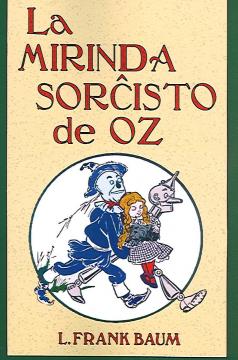|
La mirinda sorĉisto de Oz

|
|
La mirinda sorĉisto de Oz / The Wonderful Wizard of Oz |
|
Antaŭ eble 15 jaroj iu rusa esperantisto skribis al mi por demandi, kie (aŭ ĉu) li povus havigi por sia filo ekzempleron de la konata infanromano La mirinda sorĉisto de Oz de L. Frank Baum en Esperanto. Mi devis bedaŭrante respondi al li, ke tiu libro tute ne estas havebla en la internacia lingvo, kaj direktis lin al la 75-jaraĝa traduko de Alico en Mirlando... |
Perhaps 15 years ago, a Russian Esperanto speaker wrote me to ask where (or whether) he could get a copy of L. Frank Baum's famous children's novel The Wonderful Wizard of Oz for his son in Esperanto. I had to answer him, with regrets, that the book just wasn't available in the International Language, and directed him to the 75-year-old translation of Alice in Wonderland ... |
|
Nu, tempo fuĝas kaj aferoj ŝanĝiĝas. En 1996, Donald Broadribb en Aŭstralio aperigis paperan version de sia traduko de la Sorĉisto. Ĝi bedaŭrinde estas jam elĉerpita, sed ĝi -- kune kun la ceteraj Oz-libroj de Baum, en traduko de Broadribb -- legeblas en la reto. Mirinde! Kaj lastatempe aperis alia versio de la romano, la traduko de Harold R. DREYER, kiu sidis kelkajn jardekojn en tirkesto antaŭ ke Bero decidis aperigi ĝin. (1) |
Well, time flies and things change. In 1996, Donald Broadribb in Australia published a paper version of his translation of the Wizard. Unfortunately, it's already sold out, but it -- as well as Baum's other Oz books, in translation by Broadribb -- can be read on the net. Wonderful! And another version of the novel recently appeared, Harold R. DREYER's translation, which sat in a drawer for several decades before Bero decided to publish it. (1) |
|
Mi ne scias, kiom da legantoj iam ajn legis la libron, sed supozeble preskaŭ ĉiu vidis la filmversion kun Judy GARLAND, do apenaŭ necesas skizi la intrigon. La filmversio pli-malpli fidelas la romanon ĝis post la forbalonado de la Sorĉisto. La traduko fidelas almenaŭ samgrade ... |
I don't know how many readers have ever read the book, but I suppose that almost everybody has seen the film version with Judy Garland, so it's hardly necessary to sketch the plot. The film version is more or less faithful to the novel, up to the point at which the Wizard flies away in a balloon. The translation is faithful to at least the same degree ... |
|
Lingve, mi trovis kelkajn mankojn. Ne ĉiam la tempoj de subordaj verboj estas ĝustaj. Oni tro ofte ellasis la -N post la kunordiga konjunkcio kiel kiam ĝi ligiĝas kun objekto. Kaj Dreyer uzas la radikon farm' samsignife kun la anglalingva vorto "farm", kvankam en la nuna tempo la signifoj estas malsamaj (la vera signifo troviĝas en la iom pli arĥaa angla esprimo "to farm out"). Aliflanke, Dreyer ne hezitas verbigi adjektivojn -- jam en la dua frazo, ilia domo malgrandis -- Broadribb tradukas, ne malpli ĝuste sed eble malpli trafe, estis malgranda. Ankaŭ pri la nomoj de la diversaj ozaj popoloj la sistemo de Dreyer devias de tiu de Broadribb; Dreyer simple transskribas la nomojn, aldonante la ĝustajn finaĵojn; Broadribb provas esti iom pli lerta pri la tradukado, provante trovi sencojn en la originalaj nomoj kaj tradukante la trovitajn sencojn. Ekzemple, "Munchkins" fariĝas ĉe Dreyer Munĉkenoj kaj ĉe Broadribb Manĝtuloj, supozeble pro trovo de manĝ' en la angla "munch". Mi dubas, ĉu neanglalingvano povus preferi unu sistemon super alia, sed por mi tiu de Broadribb ŝajnas tro precioza; mi mem tradukus tiun vorton tute same kiel Dreyer. |
Linguistically, I found a few lacunae. The tenses of subordinate verbs are not always correct. The -N is too often omitted after the coordinating conjunction kiel when it is linked with an object. And Dreyer uses the root farm' with the same meaning as the English "farm", although at the present time the meanings are different (the real meaning is found in the somewhat more archaic English expression "to farm out"). On the other hand, Dreyer does not hesitate to convert adjectives to verbs -- as early as the second sentence, ilia domo malgrandis -- Broadribb translates, no less correctly but perhaps less strikingly, estis malgranda. Also Dreyer's system for the names of the various peoples of Oz deviates from that of Broadribb; Dreyer simply transscribes the names, adding the correct endings; Broadribb tries to be somewhat more clever with his translation, trying to find meanings in the original names and translating those meanings as found. For example, "Munchkins" becomes Munĉkenoj in Dreyer and Manĝtuloj in Broadribb, apparently because of finding manĝ' in the English "munch". I doubt whether a non-English-speaker would prefer one system over another, but for me Broadribb's seems too cute; I myself would translate that word just as Dreyer did. |
|
Nu, mem provu. Vi povas aĉeti la Dreyer-tradukon ĉe ELNA aŭ ĉe ĉiu Esperanta libroservo. La Broadribb-tradukon vi trovas (ankaŭ ilustrita de Denslow) ĉi tie. |
Well, try it for yourself. You can buy the Dreyer translation from ELNA or any Esperanto book service. The Broadribb translation is to be found (also with illustrations by Denslow) here. |
| (1) Kaj ankaŭ aperis nova traduko, ankaŭ de Broadribb, de Alico en Mirlando, ĉe Sezonoj, en Jekaterinburg. | (1) And a new translation of Alice in Wonderland, also by Broadribb, has appeared from Sezonoj in Ekaterinburg. |








